Doubt Is An Important Step In The DNA Discovery Process
Doubt is a common reaction in unexpected DNA family discoveries.
It’s not only common, it’s also normal and important. For those of you on the doubting side, this previously posted article is for you.
If you are the one being ignored, denied, or accused as a scammer, today’s post is for you.
In the surprise discoveries I have come to know and hear about over the past seven years, doubt is pervasive. It can feel disheartening and hurtful when you are the person reaching out. Good news is that it resolves with time in most cases.
So, why doubt at all? The most obvious reason is that a discovery can feel so unbelievable at first that it doesn’t feel real. And as one member of the Watershed DNA online group wrote, “With the prevalence of online/email scams these days, one would be naive to not at least consider that possibility.”
In other situations, the doubt comes from an intuition that the DNA result truly doesn’t make sense. Sometimes, a conclusion about a family relationship is made out of haste or insufficient evidence, and it is later revealed to be wrong/false. The DNA companies’ online reporting systems and the way they report relationships (sometimes wrongly) can be a reason for this.
One example of a common false conclusion is that of naming the wrong brother in a set of siblings as the biological father.
The DNA Clarity and Support podcast guest Richard Hill talked about this happening to him. For a number of years, the Y chromosome DNA evidence Richard had and the circumstantial evidence Richard gathered seemed to point to one brother in a set of 5 as his biological father. When autosomal DNA testing became available a few years later, and Richard and additional family members tested, it became clear that a different brother was Richard’s father.
Richard has made it a goal to educate others about DNA in family searches and has written two books for your benefit. One documents his personal journey as a late-discovery adoptee and the other is a hands-on introduction about DNA testing basics. You can find them here and here.
If you or someone you match by DNA is in the doubt stage of discovery, it’s important to give it attention and recognize it as a stage of the journey and not an end point.
>>DOUBT IS A HEALTHY AND IMPORTANT STEP IN DNA RELATIVE DISCOVERIES.<<
It doesn't feel that way to the person who is reaching out trying to find answers or make a connection, though. It feels like rejection. What do you do if it happens to you?
The first step is to go back and reconsider all of the evidence you have. Is there any reason to doubt your conclusion? Has someone with a lot of DNA experience gone through your results and ruled out all other theories for the discovery? Reviewing all of the reasons for DNA testing having been wrong in the past (and checking off each one for your situation) can help. Read Could the DNA Test Be Wrong? and systematically rule out the reasons that can raise doubt about DNA results.
You can feel more confident about your assertion about the genetic relationship, and offer up that information to the other party if they are open to it.
The other step is to allow for the passage of time.
While you wait for the other side to adjust, lean on others for support and encouragement. Find a counselor to support you. It can take weeks or months (occasionally, years) for biological family to have gone through the process of adjusting to the shock. Just as the discovery might have been traumatic to you or might have taken a huge amount of courage to overcome fears around rejection, it can be traumatic to the contacted family. They are finding out their family tree has a different structure than what they always believed, or they might be learning for the first time that a parent was keeping a secret. They might be terrified that others who learn of a secret will shun them or begin to view them differently.
Unexpected family discoveries are rarely seamless. The complexity of families and the family dynamics that have formed over decades cannot be unfurled in a short time.
When you reach out and reveal an unexpected genetic relationship, you are the one in control and have had at least a short period of time to grapple with the information. The person or family you contact is not in control, and their reaction is an immediate response. They might be experiencing shock, fear, doubt, insecurity, and resistance to change.
HAVE COURAGE AND KNOW THE DOUBT PHASE WILL LIKELY PASS WITH TIME.
In the meantime, look to others for support. Oftentimes this means looking outside of your usual supports. Those in your circle of family and friends might not have any frame of reference to understand what you’re going through.

